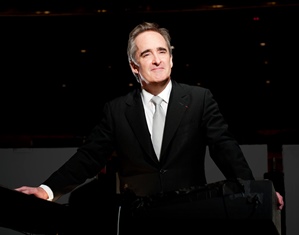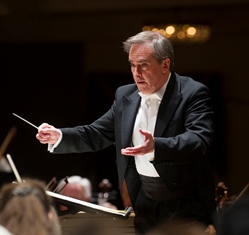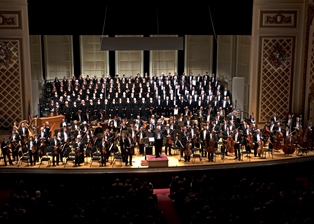
James Conlon, Arts Advocate

He is an advocate for music and the arts in other media, as well. He is a writer with his own blog, “A Rich Possession,” at MusicalAmerica.com. He writes for music magazines such as Gramophone and Opera News, and he is a public speaker who lectures before all of his L.A. Opera performances.
He even takes on public issues, having addressed an open letter to the superintendent of the Los Angeles Unified School District to urge that music and art education not be eliminated from the elementary schools.
His most recent blog for Musical America, entitled “The Regeneration Gap” is about passing on the knowledge and love of music to the younger generation. (Access at http://www.musicalamerica.com/mablogs/?p=9717)
“I love writing,” said Conlon after a May Festival rehearsal last week. It focuses my brain differently. I started writing over 20 years ago. First it was occasional. I started to write a statement about my new productions in Cologne. The program books there always had an article by the stage director. I felt that there had to be something to talk about the work, not from the viewpoint of explaining a concept of a production, but from the work. I started with ‘Pelleas and Melisande’ (Debussy). That was in 1992.
“Then in 1994, I wrote an article for Opera News on ‘Lady Macbeth of Mtsensk’ (Shostakovich). It was a new production. It had never been done at the Met (New York’s Metropolitan Opera) before. When I got to Paris (Conlon was principal conductor of the Paris Opera from 1995-2004), they had beautiful program books, so I started contributing for every new production. I got into the habit.”
When Conlon moved to the Los Angeles Opera in 2006, he kept it up. “I write an article for just about every opera I conduct,” he said.
Conlon’s pre-performance talks in Los Angeles are
extremely popular. “Approximately 50-55% of the audience is there an hour
early,” he said. “The figure is like 1,000 to 1,200 people. My approach is all
centered on the work. It’s not talking to divas and such. I’m trying to build
audiences. I want to make an audience that goes to the opera because the
substance of opera becomes important in their lives, not to see Miss or Mr.
So-and-So. Star personalities play a big role in opera. It’s fine, but to me
it’s about the substance, so I talk about the history, the philosophy, the
musical developments. I do it in a way that is personable and makes them laugh
a few times, because when people laugh, they listen better. It’s not
condescending or pedantic.”

Conlon’s blogs address experiences on his travels, current issues involving music and the arts and the art form in general (his title, “A Rich Possession,” comes from the epitaph on Franz Schubert’s grave). “In my opening blog, I did say that I would return to the theme of music education over and over,” he said. In that blog, “A Peculiarly American Paradox,” Conlon notes the disparity between the great wealth of classical music and musicians in the U.S. and the demand for it. “Every arts institution I know is struggling to keep and develop its audience,” he writes. “How and why we have come to have more supply than demand, and what I hope we can do about it will occupy a significant portion of my future writings.” (See his Jan. 30, 2012 blog at http://www.musicalamerica.com/mablogs/?p=3607)
“The core problem is the disappearance of arts education in the schools, which was broad-based,” said Conlon. “It was everybody, not just talented people and people who wanted to be musicians. There were choruses, all of that. Over thirty years separate the 80s, when all the cuts started, so we now have a generation and a half of people who had no contact whatsoever. If you cut the broad base of something, you can’t expect people walking down the street to suddenly take an interest in classical music. This is not just classical music. This is all the arts in one form or another. We have to get back to young people. We can’t count on the government to do it. We can’t even really count on the education establishment, at least at the moment. They would love to see it back, but it’s beyond their power.” (For a spectacular example of what arts groups are doing in other countries, see Conlon’s June 18, 2012 blog, “A Roman Candle” at http://www.musicalamerica.com/mablogs/?p=5416)
The key, said Conlon, is “personal initiative. This means you bring your own children, you bring your grandchildren.”
Especially your grandchildren, he said. “Understandably, a lot of the audience drops out in their child-bearing years. The ones who come back in their 50s and 60s are the ones who went when they were younger, before they had their children. We don’t know if that’s going to happen again because now we’re going to have 50-year-olds, 60-year-olds who didn’t have any music education. We don’t know if that’s going to hold up. What will hold up is that the grandparents of today have an opportunity to start building a bond by going to concerts again. ‘That’s something I do with grandpa,’ says the five-year-old. ‘Grandpa takes me to concerts.’
“I think this has many values. It gets them into concert halls. They do it with somebody who has meaning to them. It builds bonding relations. People should be doing everything that comes into their mind, work through their churches, their temples and synagogues. Everybody has to take the initiative. The normal music lover has to participate and recognize that in order to maintain the tradition, it can’t wait for the institutions. They can do it themselves.”
Conlon also points to some “very good ideas out there,” including one by Peter Simon, president of the Royal Conservatory of Music in Toronto, to give school credit for private music lessons. “You can’t get schools to give music lessons the way they used to, but schools can encourage people to have students study music by giving credit for studying an instrument.”
With the dearth of music education in the schools today, particularly in the primary grades, building the audience for classical music is of great concern. One way is by utilizing multi-media. “The (video) screens at the Ravinia Festival, at first it was an experiment,” said Conlon, who has been music director at Ravinia since 2005. “The old guard didn’t like it, but we’ve found now that we can’t not do it anymore, because people like it.
The art shows presented at the May Festival are another example, as with Berlioz’ “L’enfance du Christ” and “Romeo and Juliet” (2007 and 2008) and Bach’s “St. Matthew Passion” (2010), where images of great art were projected onto a screen above the stage during the performance. “Everybody loved ‘L’enfance du Christ,’ and most people loved ‘Romeo and Juliet.’ Some people didn’t like Bach because they don’t need it. So there you guess. There’s great fear of Bach -- not by people who know and love it, but people who go, ‘Oh, it’s long and slow,’ so we took a chance. It’s a little harder to run a slide show against an absolute masterpiece like the ‘Matthew Passion.’ Did it bring the experience down or up? We probably brought it down for some people, whereas something like ‘L’enfance du Christ,’ which people are unfamiliar with, benefited from it. You’ll get it right sometimes and you’ll get it wrong other times.”
(Coming up at this year’s May Festival is Stravinsky’s “Oedipus Rex,” with semi-staging by Ed Stern, former director of Cincinnati’s Playhouse in the Park. The performance is at 8 p.m. May 17 at Music Hall.)
New music, perceived by some as a route to creating new audiences, is “a hard question and a highly politicized one,” said Conlon. “It has yet to be proven that new music makes new audiences in classical music. It’s a theory and there are two viewpoints. There is the ideological one, which is that it’s the right idea. Artists, the press in general, institutions, we all agree that it’s the right idea. Playing devil’s advocate, you look at the statistics and they don’t bear up. What you do about it becomes again a measure of your ideological point of view: You just continue to insist on it, or the other ideological universe, which is ‘no one’s coming to it, so why are you spending our shortened budgets on it?’”
As far as the
Cincinnati May Festival goes, the issue is “preserving something that has
basically disappeared from American life, which is the centrality of choral
repertory. Has it disappeared? No. It doesn’t mean you won’t hear the Mozart
Requiem in New York or the Mahler 8th Symphony in Chicago. What it
does mean is that there is nothing like the May Festival, where there is a
concentration for a two-week period on an art form, which is great choral
classical music.”

Conlon, who will celebrate his 35th year as May Festival music director next season and has just renewed his contract through 2016, resists changing the festival to increase the audience. “Change it into a pops festival? Change into crossover? No. Occasionally do something crossover? Maybe, but not the core of the festival. Our mission is not to be a pops festival. Our mission is to be what classical choral music is.”
This is what attracted Conlon to Cincinnati in the first place. “James Levine recommended me to the board and the festival to me. He said, ‘look, you’ll be able to do all this repertory.’ The fact is that as a music director for any major symphony orchestra, you would not do the quantity of choral music we do in two weeks here in an entire season – not meaning it would take you a season to do it, but you just wouldn’t do it. You would do one or two.’”
Conlon’s love for choral music and the opportunity to perform it at the May Festival is the “great artistic attraction” for him, said Conlon, “but it went way beyond that years ago. It became a sense of connection with the people of Cincinnati, with the orchestra, the chorus, the hall, with the tradition of coming here every May. It is so much a part of my life and has been from almost the beginning of my professional life. I basically had been out in my professional career for five years before I came here. I barely can conceive of my life without it.”
To access James Conlon’s writing, visit his web site www.jamesconlon.com
James Conlon leads the May Festival Chorus, the Cincinnati Symphony Orchestra and guest soloists in the final weekend of the 2013 Cincinnati May Festival at 8 p.m. Friday and Saturday at Music Hall. Friday’s program comprises Stravinsky’s oratorio “Oedipus Rex,” Debussy’s “The Blessed Damozel” and “Sirènes” from “Nocturnes” and Ravel’s “Daphnis et Chloé” Suite No. 2. On Saturday, hear choruses and scenes from operas by Richard Wagner (“Lohengrin,” “Tannhäuser,” “Die Walküre,” “Die Meistersinger”) and Giuseppe Verdi (“Aida,” “Nabucco,” “Macbeth,” “Otello,” “I vespri siciliani”). Information and tickets at www.mayfestival.com
The 2013 Cincinnati May Festival
May 10. Music Hall. Alexander Zemlinsky, Psalm 23 and Psalm 13. Mozart, Requiem. May Festival Chorus. May Festival Youth Chorus. Soprano Janai Brugger. Mezzo-soprano Daniela Mack. Tenor Richard Croft. Bass Jordan Bisch. Cincinnati Symphony Orchestra. James Conlon, conductor.
May 11. Music Hall. Benjamin Britten, War Requiem. May Festival Chorus. Cincinnati Children’s Choir. Soprano Christine Brewer. Tenor Alek Shrader. Baritone Phillip Addis. Cincinnati Symphony Orchestra. James Conlon, conductor.
May 12. Cathedral Basilica of the Assumption, Covington. May Festival Chamber Choir. May Festival Youth Chorus. William Byrd, "Sing Joyfully.” Thomas Weelkes, "Hosanna to the Son of David.” Benjamin Britten, Te Deum in C (May Festival Youth Chorus). Henryk Gorecki, "Totus Tuus.” Arvo Pärt, "Zwei slawische Psalmen" (Psalms 117 and 131). Ola Gjeilo, "Ubi Caritas.” Benjamin Britten, “Rosa Mystica" from "Ad Majorem Dei Glorium.” Morten Lauridsen, "Ave Maria." James MacMillan, "Data est mihi omnis potestas" from "Strathclyde Motets.” Robert Porco and James Bagwell, conductors.
May 17. Music Hall. Stravinsky, “Oedipus Rex.” Debussy, “The Blessed Damozel” and “Sirenes” from “Nocturnes.” Ravel. “Daphnis et Chloé,” Suite No. 2. May Festival Chorus. Soprano Tracy Cox. Mezzo-soprano Ronnita Nicole Miller. Tenor Ben Bliss. Tenor Rodrick Dixon. Baritone Donnie Ray Albert. Bass-baritone Richard Bernstein. Narrator Joneal Joplin. Stage director, Ed Stern. Cincinnati Symphony Orchestra. James Conlon, conductor.
May 18. Music Hall. Wagner: Freudig begrussen wir die edle Halle from "Tannhauser." Treulich gefuhrt from "Lohengrin." Brunnhilde and Wotan's scene from act III of "Die Walkure." Wachet auf, es nahet gen den Tag and the finale from act III of "Die Meistersinger von Nurnberg.” Verdi: March, triumphal scene, ballet music and chorus from act II of "Aida." Gli arredi festivi and chorus from act I of "Nabucco." Va pensiero from act III of "Nabucco." Patria oppressa from act IV of "Macbeth." Fuoco di gioia from act I of "Otello." O splendide feste from "I Vespri Siciliani." Si celebri alfine tra canti from act IV of "I Vespri Siciliani." May Festival Chorus. Soprano Christine Goerke. Bass-baritone Alan Held. Cincinnati Symphony Orchestra. James Conlon, conductor.
Information and tickets at www.mayfestival.com